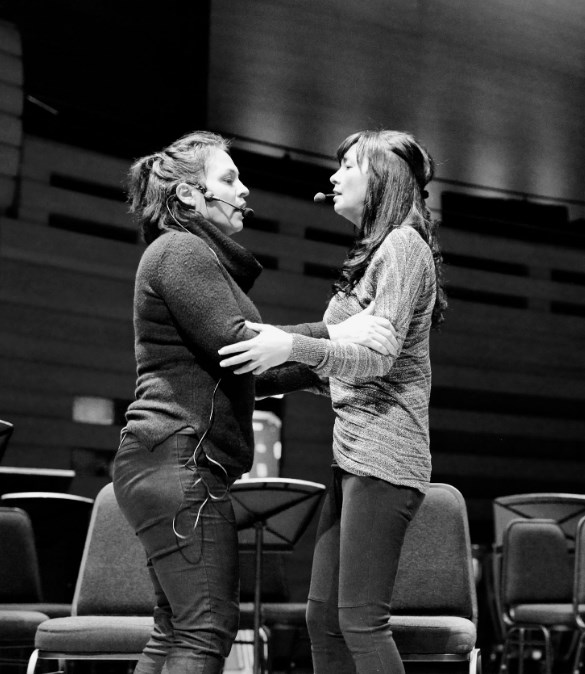A recent recording has given new life to a more than decade-old piece of Indigenous-focused music.
Alexina Louie’s Take The Dog Sled, which was first performed in 2008 with the Montreal Symphony Orchestra, was released on CD in November, performed by the Esprit Orchestra and featuring throat singers Akinisie Sivuarapik and Evie Mark.
Louie has been working in the music industry since the early 1980s and is a recipient of the Order of Canada and a pair of Juno Awards for best Classical Composition in 1989 and 2000.
Mark was involved in the initial release of Take The Dog Sled and performances of the project, which involved the fusion of classical music alongside traditional throat singing.
“Looking back at the tours and the shows that we’ve done, it’s given me a lot of opportunity to meet a lot of new people,” Mark said. “It was something very unique. Every time we did the tour there was always something new to experience.”
Mark, who grew up in Ivujivik, Que., described her personal history with throat singing.
“Traditional songs and traditional folk singing were sort of a part of my life growing up, but we didn’t hear it regularly,” she said. “It seemed like a foreign sound to our young ears.”
She said colonization was the driving force behind the traditional art form being phased out of society.
“It was seen as satanic,” she said. “It had never really been introduced to us on a regular basis.”
However, she recalls a specific instance hearing a performance at 10 years old and decided she’d like to give it a try herself.
“It really captured my attention,” she said. “My hair went straight up.”
The eight-song, 22-minute recording of Take the Dog Sled is available for purchase through the Canadian Music Centre website. Additionally, it can be streamed on Spotify and Apple Music.
Mark acknowledges there were some jitters during her early days performing. She couldn’t read music, she didn’t know how to read a conductor, she was afraid of what the Elders would think of her mixing the ancient form of singing with an orchestra. But Mark says she has developed more confidence over the years.
“There’s a huge difference with who I am today and the young mother who started that journey. There’s a lot of growth that happened in between.”
Mark explained the throat singing in Take The Dog Sled.
“It is the imitation of sounds that we hear around,” she said. “Around the Inuit, it would be wind, the animals, nature in general, people cooking, boiling water, the sounds of the hungry stomach. It tries to capture the sounds of the environment of the Arctic.”
In a blog post from 2018 by Louie reflecting on the initial premiere of the piece, she recalls what it was like creating the work with Mark.
“I began to understand the challenges that the Inuit have faced – the extreme cold, their dependence on the land for survival, the hunting expeditions they undertook each season to bring back food for their families and communities,” Louie wrote.
“Evie is such a remarkable human being. She shared with me so many stories. I took these stories into my consciousness and turned them over in my mind.”
Though she grew up in Northern Quebec, Mark now lives in Montreal, and doesn’t consider herself to being living the “organic life” that her ancestors did.
However, Mark feels that her artwork has allowed her to honour her heritage, and her grandmother who was involved in teaching Mark about the history and significance of the throat singing art form.
“I’m sort of mimicking what my grandmother did,” she said. “I tried to help to revitalize throat singing. [I’ve gained] confidence and a better sense of my identity. I’m sure it’ll give the same confidence and boost of pride to the young people of today.”
Today, Mark works as an instructor at Nunavik Sivunitsavut, a post-secondary program affiliated with John Abbott College located in Montreal. The programs are for students from the Nunavik region in Northern Quebec, and Mark teaches throat singing along with other arts at the school.
“It’s a great opportunity for young people to learn about their history in any format,” Mark said.
Mark admits that it’s been hard to have limited singing opportunities with social distancing measures and mask wearing in effect.
“It’s been quite the challenge. [In one lesson] all we did was listen to audio and explained the theoretical part of the songs,” Mark said. “There’s no emotions involved whatsoever.”
While the courses at Nunavik Sivunitsavut are typically just one year long, Mark hopes that students will be inspired to continue on with the art form.
“I wish I could have these students again after the pandemic,” Mark said. “I want them to have the feeling I get when I throat sing.”




